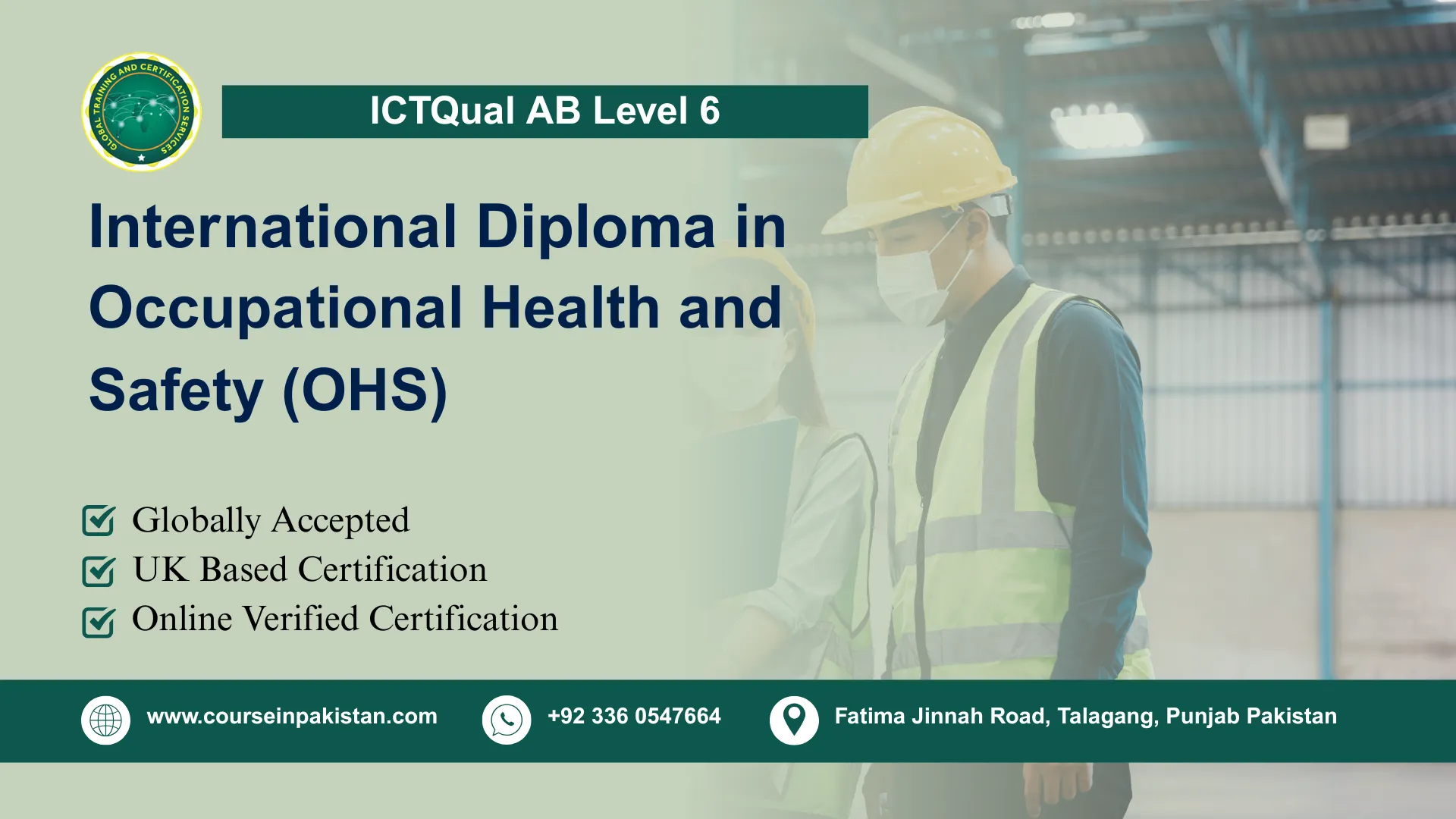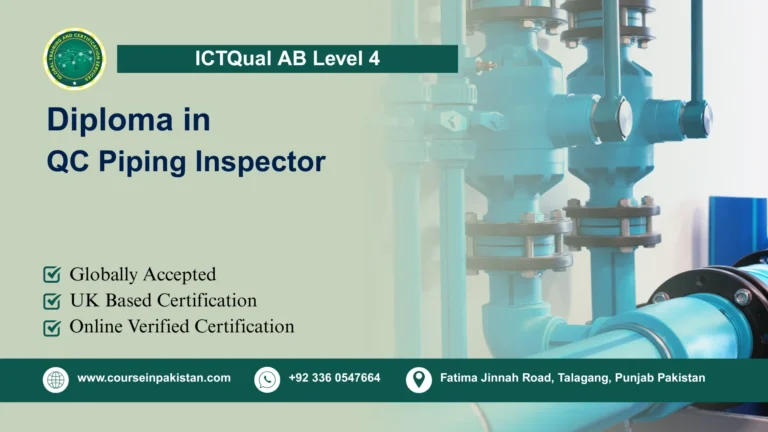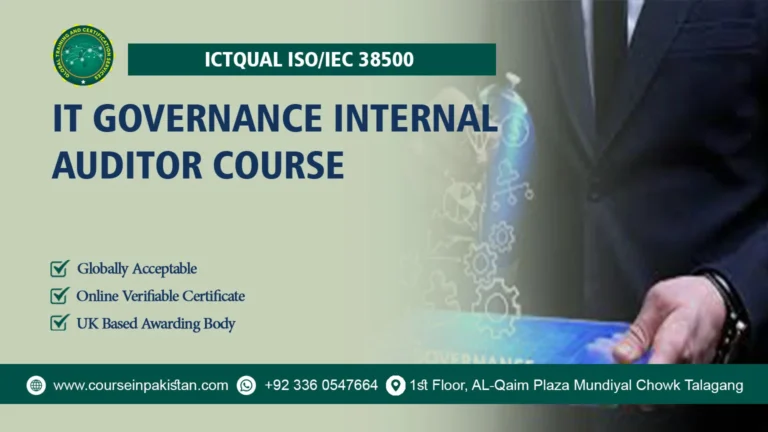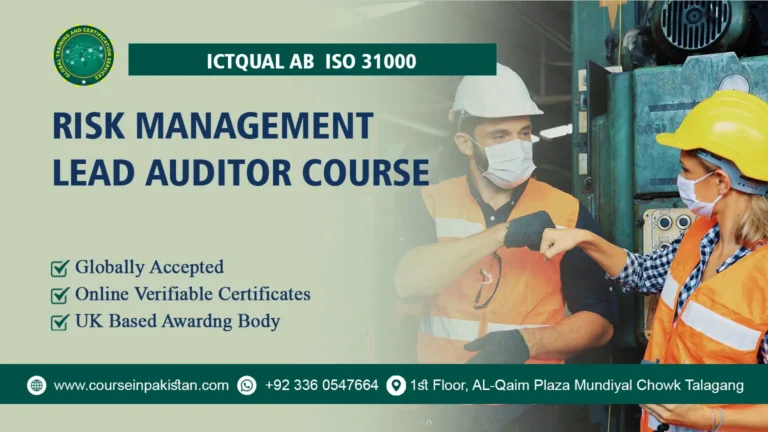
The ICTQual AB Level 6 International Diploma in Occupational Health and Safety (OHS) is a globally recognized qualification designed to equip learners with advanced knowledge and practical skills in occupational health, workplace safety, and risk management. The program focuses on understanding occupational hazards, implementing safety management systems, and ensuring compliance with international health and safety standards. Learners will gain expertise in accident prevention, emergency response, legal compliance, hazard control, and employee wellbeing, preparing them for leadership roles in diverse industries.
This course blends theoretical learning with practical applications, allowing learners to design and implement comprehensive safety programs, conduct risk assessments, and lead health and safety initiatives effectively. Graduates will be equipped to create safer work environments, enhance organizational productivity, and meet legal and regulatory requirements, making them highly sought-after professionals in industries worldwide.
Course Overview
The ICTQual AB Level 6 International Diploma in Occupational Health and Safety (OHS) is a 360-credit, fully assignment-based qualification, allowing learners to study at their own pace from anywhere in the world. It is British Council verificable and MOFA/Embassy attestable, providing recognition for employment, career advancement, and iqama approval.
This qualification is ideal for both fresh learners and experienced professionals. Fresh students are required to complete all 36 mandatory assignments within three years. Experienced professionals with at least 6 years of relevant experience can complete the certification in a shorter timeframe by submitting verifiable experience and defending their knowledge in professional discussion meetings with an ICTQual AB approved assessor, without completing all mandatory assessments. By the end of this program, learners will have the knowledge, practical skills, and leadership capabilities to manage workplace safety, enforce health and safety regulations, and lead OHS initiatives across industries globally.
Key Highlights of the Course:
- Fully 360-credit Level 6 diploma, flexible and self-paced study
- British Council verificable and MOFA/Embassy attestable qualification
- Suitable for fresh learners and experienced professionals with accelerated pathways
- Focus on practical occupational health, workplace safety, and risk management
- Globally recognized for career advancement and iqama approval
Course Benefits
Career Advancement
- Prepare for managerial and leadership roles in occupational health and safety
- Enhance employability across manufacturing, energy, construction, and service sectors
- Gain recognition for expertise in workplace safety and regulatory compliance
Professional Recognition
- Obtain a British Council verified and MOFA/Embassy attestable qualification
- Validate professional experience and knowledge for career growth and iqama approval
- Strengthen credibility for international OHS roles
Flexible Learning
- Complete the diploma entirely through assignments at your own pace
- Accelerated completion option for experienced professionals
- Study from anywhere in the world without classroom constraints
Practical Skills Development
- Learn to identify occupational hazards, assess risks, and implement control measures
- Gain expertise in emergency response, occupational health, and safety leadership
- Develop problem-solving, decision-making, and strategic planning skills
Academic and Professional Pathways
- Foundation for postgraduate studies in Occupational Health, Industrial Safety, or Risk Management
- Advanced certifications in safety management, emergency response, or workplace wellbeing
- Opportunities to join global professional networks in occupational health and safety
Course Study Units
This qualification, the ICTQual AB Level 6 International Diploma in Occupational Health & Safety (OHS), consists of 36 mandatory units.
Year 1 – Foundation of Occupational Health & Safety (OHS)
- Principles of Occupational Health & Safety Management
- International Health & Safety Legislation and Compliance
- Risk Assessment and Hazard Identification
- Accident Investigation and Incident Reporting
- Fire Safety and Emergency Preparedness
- Environmental Health & Safety (EHS) Fundamentals
- Workplace Ergonomics and Human Factors
- Safety Culture and Behavioural Safety
- Occupational Health and Industrial Hygiene
- Personal Protective Equipment (PPE) Management
- Workplace Safety Auditing and Monitoring
- Communication and Training in Health & Safety
Year 2 – Applied Occupational Health & Safety (OHS)
- Advanced Risk Management and Control Strategies
- Safety Leadership and Organizational Culture
- International Standards and ISO 45001 Implementation
- Construction and High-Risk Industry Safety
- Process Safety and Chemical Hazard Management
- Occupational Disease Prevention and Control
- Crisis and Disaster Management in the Workplace
- Transportation and Logistics Safety Management
- Contractor and Supply Chain Safety Oversight
- Sustainability and Corporate Responsibility in OHS
- Research Methods in Occupational Health & Safety
- Final Project / Professional Practice in OHS
Year 3 – Professional Competence and Specialized OHS Practice
- Strategic OHS Management and Policy Development
- Advanced Workplace Health Promotion and Well-being
- Safety Technology, Digital Tools, and Data Analytics
- Global Perspectives in Occupational Health & Safety
- Corporate Governance and Ethical Responsibilities in OHS
- Industrial Safety in Oil, Gas, and Energy Sectors
- Safety in Healthcare and Public Service Environments
- Emerging Risks and Future Trends in Workplace Safety
- Training Design and Development for OHS Professionals
- Independent Research Project in Occupational Health & Safety
- Professional Practice, Portfolio, and Competence Review
- Final Capstone Project / Dissertation
Learning Outcomes
Year 1 – Foundation of Occupational Health & Safety (OHS)
Principles of Occupational Health & Safety Management
- Understand fundamental principles of OHS management
- Apply safety frameworks to workplace environments
- Evaluate the effectiveness of safety policies and procedures
International Health & Safety Legislation and Compliance
- Comprehend global and national health & safety laws
- Apply legal requirements to ensure organizational compliance
- Evaluate the impact of legislation on workplace safety management
Risk Assessment and Hazard Identification
- Identify workplace hazards across various sectors
- Conduct basic risk assessments and evaluate potential impacts
- Develop strategies to mitigate identified risks
Accident Investigation and Incident Reporting
- Conduct investigations of workplace incidents and accidents
- Identify root causes and contributing factors
- Recommend corrective and preventive actions
Fire Safety and Emergency Preparedness
- Understand fire risks, emergency procedures, and safety planning
- Implement fire safety and emergency response measures
- Evaluate the effectiveness of emergency preparedness programs
Environmental Health & Safety (EHS) Fundamentals
- Understand environmental impacts of industrial operations
- Apply EHS principles to minimize workplace risks
- Evaluate environmental compliance in workplace operations
Workplace Ergonomics and Human Factors
- Identify ergonomic risks and human factors affecting safety
- Apply ergonomic principles to enhance worker safety
- Evaluate workplace ergonomics and implement improvement strategies
Safety Culture and Behavioural Safety
- Understand concepts of safety culture and human behavior in safety
- Promote behavioral safety programs within organizations
- Evaluate the effectiveness of safety culture initiatives
Occupational Health and Industrial Hygiene
- Understand occupational health hazards and hygiene practices
- Apply preventive measures to reduce workplace illnesses
- Evaluate workplace health monitoring and intervention outcomes
Personal Protective Equipment (PPE) Management
- Identify suitable PPE for various hazards
- Implement PPE management systems in organizations
- Evaluate PPE effectiveness and compliance with safety standards
Workplace Safety Auditing and Monitoring
- Conduct safety audits and inspections
- Monitor key safety performance indicators
- Recommend improvements based on audit outcomes
Communication and Training in Health & Safety
- Develop effective safety communication strategies
- Design and deliver OHS training programs
- Evaluate the impact of training and communication on workplace safety
Year 2 – Applied Occupational Health & Safety (OHS)
Advanced Risk Management and Control Strategies
- Conduct comprehensive risk assessments in complex environments
- Develop and implement advanced hazard control strategies
- Evaluate risk management effectiveness
Safety Leadership and Organizational Culture
- Develop leadership skills for promoting safety
- Implement organizational change to enhance safety culture
- Evaluate leadership impact on workplace safety performance
International Standards and ISO 45001 Implementation
- Understand international OHS standards and frameworks
- Implement ISO 45001 and other relevant standards in organizations
- Evaluate compliance and effectiveness of management systems
Construction and High-Risk Industry Safety
- Identify safety challenges in construction and high-risk industries
- Apply sector-specific safety management strategies
- Evaluate operational safety performance in high-risk environments
Process Safety and Chemical Hazard Management
- Understand process safety principles and chemical hazards
- Implement safety controls to prevent industrial accidents
- Evaluate compliance with process safety and chemical management standards
Occupational Disease Prevention and Control
- Identify common occupational diseases and their causes
- Apply preventive strategies to protect worker health
- Evaluate effectiveness of occupational health programs
Crisis and Disaster Management in the Workplace
- Develop crisis management and emergency response plans
- Implement workplace disaster preparedness measures
- Evaluate the effectiveness of crisis management procedures
Transportation and Logistics Safety Management
- Identify risks in transportation and logistics operations
- Apply safety management principles to transport and logistics
- Evaluate performance and compliance in workplace logistics safety
Contractor and Supply Chain Safety Oversight
- Develop strategies for managing contractor and supply chain safety
- Implement oversight and compliance monitoring
- Evaluate safety performance across the supply chain
Sustainability and Corporate Responsibility in OHS
- Integrate sustainability principles into occupational health and safety
- Apply corporate social responsibility strategies in workplace safety
- Evaluate long-term impact of OHS initiatives on organizational sustainability
Research Methods in Occupational Health & Safety
- Apply research methodologies to OHS projects
- Collect, analyze, and interpret workplace safety data
- Evaluate findings to inform safety management strategies
Final Project / Professional Practice in OHS
- Conduct practical workplace safety projects
- Apply theoretical knowledge to real-world scenarios
- Present outcomes with recommendations for improvement
Year 3 – Professional Competence and Specialized OHS Practice
Strategic OHS Management and Policy Development
- Develop organizational OHS policies and strategic plans
- Implement policies to ensure compliance and safety culture
- Evaluate policy effectiveness and organizational impact
Advanced Workplace Health Promotion and Well-being
- Design workplace health promotion initiatives
- Implement employee wellbeing programs
- Evaluate outcomes on workforce productivity and safety
Safety Technology, Digital Tools, and Data Analytics
- Utilize digital tools for safety monitoring and management
- Apply data analytics to improve OHS performance
- Evaluate effectiveness of technology in enhancing workplace safety
Global Perspectives in Occupational Health & Safety
- Understand global trends and emerging issues in OHS
- Apply international best practices in local contexts
- Evaluate organizational alignment with global OHS standards
Corporate Governance and Ethical Responsibilities in OHS
- Understand ethical and governance principles in OHS
- Implement corporate responsibility strategies in safety programs
- Evaluate ethical compliance in organizational safety practices
Industrial Safety in Oil, Gas, and Energy Sectors
- Identify industry-specific hazards and safety protocols
- Apply safety management practices in oil, gas, and energy industries
- Evaluate compliance and performance in industrial settings
Safety in Healthcare and Public Service Environments
- Identify safety challenges in healthcare and public services
- Implement appropriate OHS strategies for these environments
- Evaluate the impact of safety programs on service delivery
Emerging Risks and Future Trends in Workplace Safety
- Recognize emerging hazards and workplace safety trends
- Develop proactive strategies to manage future risks
- Evaluate organizational preparedness for emerging safety challenges
Training Design and Development for OHS Professionals
- Design and implement effective OHS training programs
- Apply adult learning principles in workplace safety education
- Evaluate training effectiveness and learning outcomes
Independent Research Project in Occupational Health & Safety
- Conduct in-depth research on a relevant OHS topic
- Analyze and present data with actionable recommendations
- Demonstrate professional competence in applied research
Professional Practice, Portfolio, and Competence Review
- Compile evidence of professional competence in OHS
- Review and reflect on workplace safety practice and achievements
- Demonstrate readiness for senior-level safety responsibilities
Final Capstone Project / Dissertation
- Integrate knowledge from all units into a comprehensive project
- Plan, implement, and evaluate a workplace safety initiative
- Demonstrate leadership, analytical, and strategic decision-making skills
Who is This Course For?
Aspiring OHS Professionals
- Individuals seeking a career in occupational health, workplace safety, and risk management
- Fresh graduates aiming to gain advanced knowledge and globally recognized certification
Experienced Practitioners
- Professionals working in manufacturing, construction, oil & gas, healthcare, or public service sectors
- Individuals seeking accelerated certification based on relevant experience and professional discussion assessments
Self-Motivated and Flexible Learners
- Learners capable of completing assignment-based study at their own pace
- Individuals who prefer online learning from any location globally
Future Leaders and Strategists
- Learners aspiring to take on leadership roles in OHS management and policy development
- Professionals looking to implement strategic safety programs and lead crisis management initiatives
Globally Oriented Professionals
- Individuals aiming for British Council verified and MOFA/Embassy attestable qualification
- Professionals seeking career advancement and iqama approval in local and international markets
Future Progression
- Leadership and managerial roles in occupational health and safety departments
- Specialist roles in risk assessment, safety audits, and emergency response management
- Strategic positions in industrial, construction, energy, oil & gas, and healthcare sectors
- Opportunities to lead corporate social responsibility (CSR) and sustainability initiatives
- Career advancement in consultancy, safety training, and regulatory compliance
Academic Pathways:
- Progression to postgraduate studies in Occupational Health, Industrial Safety, or Risk Management
- Advanced certifications in safety management, emergency response, or workplace wellbeing
- Specialization programs in human factors, safety culture development, or digital safety technologies
- Opportunities to join international professional networks for career growth
Conclusion
The ICTQual AB Level 6 International Diploma in Occupational Health & Safety (OHS) is a flexible, globally recognized qualification designed for both fresh learners and experienced professionals. With 36 mandatory units and 360 credits, the program equips learners with advanced skills in workplace safety, risk assessment, occupational health, crisis management, and leadership. Fresh students complete all assignments within three years, while experienced professionals with relevant experience can complete the diploma in a shorter time through professional discussion assessments. Verified by the British Council and attestable by MOFA and Embassy, this diploma prepares learners to lead occupational health and safety initiatives, ensure regulatory compliance, and enhance career prospects both locally and internationally.






